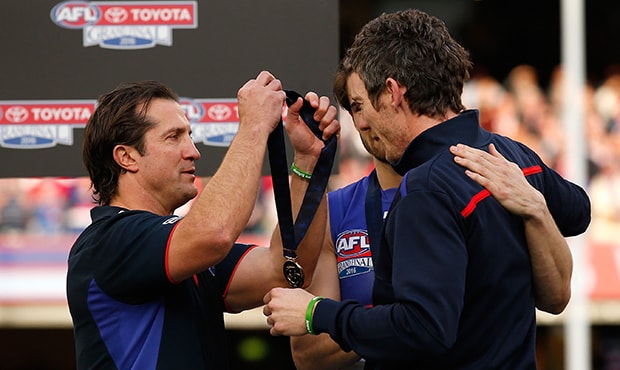AS MUCH as sparking overwhelming admiration, Luke Beveridge's fine gesture of sportsmanship in handing over his Jock McHale Medal to Western Bulldogs skipper Bob Murphy raises questions about who should be recognised with a medal after a premiership.
Dog coach gives his medal to injured skipper
Should every player who represented the winning team during the season receive a 'participants' medal or should it be restricted to the 22 playing on the day?
After all, Olympic medals are given to those who compete in the team on the route to a medal. Those who compete in winning soccer World Cup teams and in the NBA without playing in the final are recognised too, so it would not be a huge leap to make that change.
It would be a nice touch for 17 other Bulldogs who played for the club in 2016 to have a memento awarded to them.
Could the Bulldogs develop a place where Beveridge's selfless act could be recognised for those reflecting on sport and all that comes with it?
Given its significance will only grow, it would seem to be an appropriate recognition for the selfless act, a symbol all Bulldogs past and present could look back on with pride.
And why does it matter if another medal is struck for Beveridge, a suggestion Bulldogs president Peter Gordon has made, so both the giver and the receiver, and their respective families have a medal to reflect upon when their time in the game is up?
Some argue the symbolism of the moment is diminished. I understand that point but don't agree that it makes any difference. The moment will live forever.
Luke Beveridge presents injured skipper Bob Murphy with his Jock McHale Medal. Picture: AFL Photos
These are the questions I have pondered in the days following the flag as I looked at the history of premiership medals and realised anything is possible.
Premiership medals have long been awarded to premiership players, and in many years to players who did not in fact play in the Grand Final despite discussion of the process never appearing in VFL or AFL minutes.
For instance, Richmond premiership player Michael Green had a premiership medal before he had set foot on the field on a Grand Final day as he sat out the 1967 game on the bench as the Tigers' 20th man.
He subsequently received his first premiership medal at the Tigers' 1967 Annual General Meeting along with his teammates.
That he sat on the pine throughout the Grand Final did not matter to those handing out the medals because he was part of the team.
That bittersweet moment is not tough for Green to talk about because he played a key role in three subsequent flags for the Tigers in 1969, 1973 and 1974.
Such medals, handed out before 1977, were ones clubs developed, with records of them being awarded varying from year to year.
Green, now 68, describes the 1967 medal, which now sits in the Tigers' Hall of Fame along with his other three, as beautiful, 3-4 inches in diameter with an athletic body adorning it.
Geelong vice president Bob Gartland turned up evidence in his historical journeys of two premiership medals being awarded in 1884 to premiership players John Bolton and Tom Cahill, 13 years before the VFL officially began.
Essendon awarded a premiership medallion to Jack Hart in 1911 despite the fact Hart did not play in the Grand Final. He played in four games during the year.
AFL historian Col Hutchison said there was also evidence that former Geelong player Ted Llewellen was awarded a 1931 premiership medal despite not playing in the Cats' premiership that year.
He played 10 games but was given a medal, probably because he had continued training with the squad.
The Age, reporting on South Melbourne's AGM in December, 1933, wrote: "Each of the players was then handed a premiership medal, the whole [group] receiving a tremendous ovation from the delighted supporters".
But to underline the jagged path of the medallion's history, the members of the 1951 and 1952 Geelong premiership teams only received medals retrospectively when the club decided on its 150th anniversary in 2009 to strike medals in their honour.
It was 1977 when premiership medals were first awarded on the field post-game, as colour television showed the game for the first time and David Dench stood in as skipper in the absence due to a knee injury, coincidentally, of North Melbourne captain Keith Greig.
That VFL medal in 1977 was changed in the early 2000s, an image based on former Collingwood skipper Tony Shaw holding the cup aloft with the size and colour based on the 2000 Olympic gold medal.
The runner-up medal was also presented post-match until Collingwood ruckman Peter Moore, who played in five Grand Finals without a win, threw his to the ground in disappointment after the 1981 Grand Final.
We have always lived in a time of change, the game adapting to circumstances.
Gordon thought post-match it was time for a system that recognised players in the same predicament as Murphy to be introduced.
Awarding Beveridge another medal is 'the decent thing to do'
That would not diminish what Beveridge did, it would only embed it in time as a moment that taught the game it takes more than 22 and a superb coach to win a flag.


